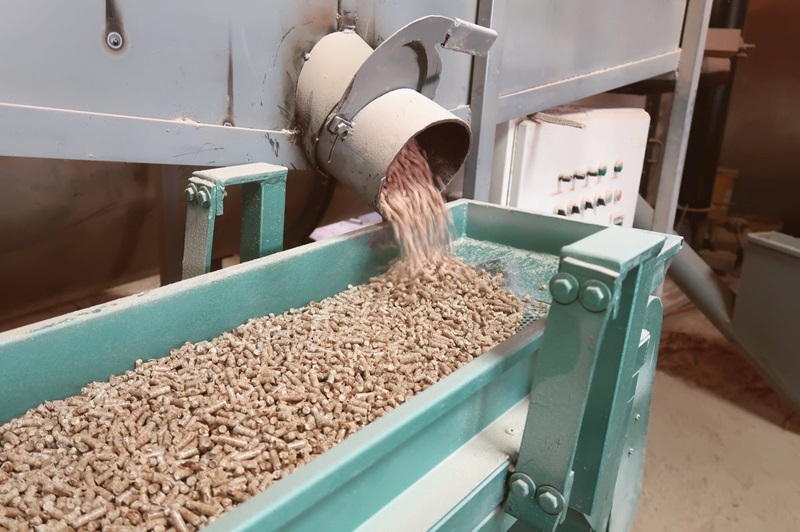It is estimated that there are about 9,000 industrial boilers in operation in Vietnam, most of which use coal for combustion.

Pellets as a source of raw materials to convert industrial boilers to biomass boilers
Pollution risks from industrial boilers
According to Mr. Tran Van Luong – Chairman of the Vietnam Association of Thermal Science and Technology, in industrial production, industrial boilers are an important device. Currently, many industries are using boilers such as: textiles, footwear, plastics, tobacco, food, alcohol, beer, soft drinks, seafood, agricultural processing, chemical production, fertilizer, sugar production, rubber production…
“There are currently no official full statistics on the number of industrial boilers. However, according to information from annual boiler inspection organizations and registration with the state labor management agency, it is estimated that there are about 9,000 industrial boilers in operation in Vietnam. Most of these facilities still use coal to operate the boiler system,” said Mr. Luong.
Using coal to operate boilers not only increases costs for businesses but is also a factor causing environmental pollution, especially air pollution.
According to Dr. To Xuan Phuc – an expert from Forest Trends, although there are no statistics on the quantity, capacity and total amount of coal being used to operate the boiler system, experts estimate that the amount of input coal being used is not small.
According to Mr. Luong, although the Government has not yet required these small-scale facilities to reduce emissions, some facilities have pioneered and voluntarily replaced part or all of the coal used for the boiler system with wood pellets. Many facilities have been making this conversion in the global supply chain, such as suppliers for large companies such as Adidas, Nike, Samsung…; some facilities are located in industrial parks where there are commitments on low emissions and green transformation.
“Converting the input coal source of these facilities to cleaner fuel sources has great potential to reduce emissions at a national scale. It is especially beneficial when Vietnam’s wood pellet industry is developing very strongly and has a stable export market,” said Mr. Luong.
Capital support for businesses to convert
According to the Forest Trends Report, in 2022, wood pellet exports exploded with an export volume of approximately 4.9 million tons, reaching nearly 790 million USD, nearly doubling in value compared to 2021 due to high pellet prices. Entering 2023, pellet export turnover decreased slightly, reaching more than 4.6 million tons with a value of nearly 680 million USD (down 4.3% in volume and 13.7% in value compared to 2022). Compared to the period of record price increases in 2022, the average export price of pellets has continuously decreased below 140 USD/ton in 2023. This figure shows that the source of pellet raw materials serving the domestic market in converting boilers to biomass, including pellets, is very abundant.
According to Dr. To Xuan Phuc, the Vietnamese Government is strongly committed to the target of Net-Zero emissions by 2050. To achieve this target, the Government has issued a number of mechanisms and policies; including Decree 06/2022/ND-CP requiring high-emission production facilities as well as ministries and sectors to reduce greenhouse gas emissions. The Government is designing the necessary policy mechanisms to build a domestic carbon credit market. With the Government’s Net-Zero commitment, there is a lot of room for the use of pellets in the domestic market.
“However, currently, policy mechanisms on greenhouse gas emission reduction only focus on high-emission facilities, mainly heavy industries such as energy, industrial chemical production, and transportation. Meanwhile, small-scale production facilities in the fields of textiles, dyeing, beer processing, soft drinks, drying systems… using industrial boilers have not received much attention, many of these facilities are still using coal to operate the boiler system” – Mr. Phuc stated the reality.
To convert boilers to biomass fuel, including pellets, according to the business community, there are many challenges. First of all, there is a lack of investment capital for the conversion; there is a lack of standards and regulations on manufacturing biomass boilers; the design and manufacturing capacity of many boiler manufacturers is still limited. In addition, the high cost of investing in new boilers, the cost of renovation and the cost of stopping production are the costs that businesses need to consider when making the conversion.
Another challenge is that the domestic carbon market has not yet been formed, so it has not created a driving force for businesses. This shows that it is necessary to quickly have specific mechanisms, policies and actions to form market demand through mandatory mechanisms or incentives for domestic facilities to convert from fossil fuels to renewable energy forms.
Regarding this issue, Mr. Luong also said that, along with ensuring a stable supply, one of the other challenges for both pellet manufacturing enterprises and boiler-using enterprises is that the domestic carbon market has not yet been formed, so it has not created a driving force for enterprises to convert. However, the Government is designing the necessary mechanisms and policies to build a domestic carbon credit market. With the Net-Zero commitment, there is a lot of room for the use of wood pellets in the domestic market.
Vinagreens IDC Joint Stock Company is proud to be a pioneer in providing Biomass fuel, helping enterprises convert to clean energy sources while still ensuring production efficiency. Currently, our company can supply Biomass output up to 5000 tons/month, ensuring the production process of the enterprise.
For any contact, please call hotline: 0912614688 or Email Sale.vinagreens@gmail.com.



